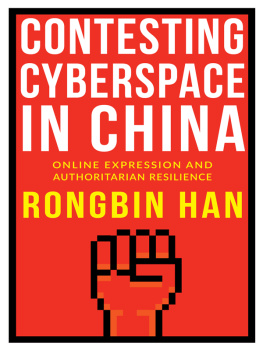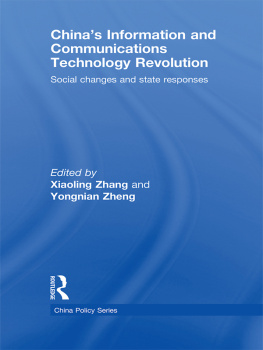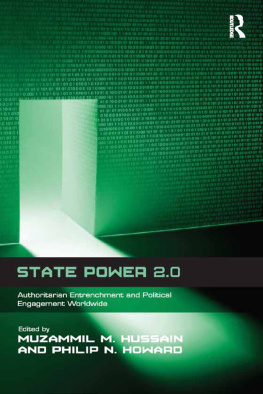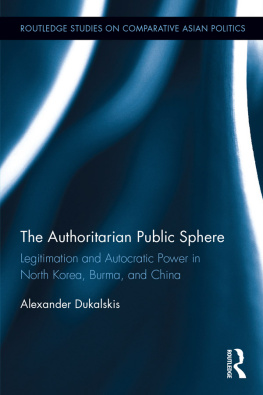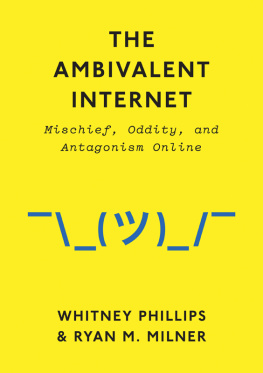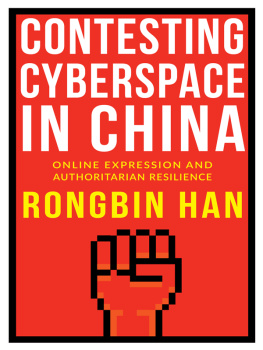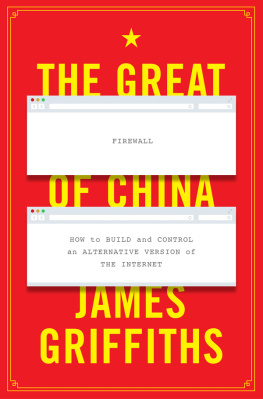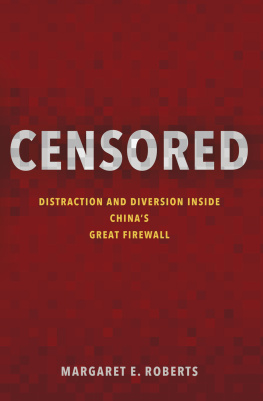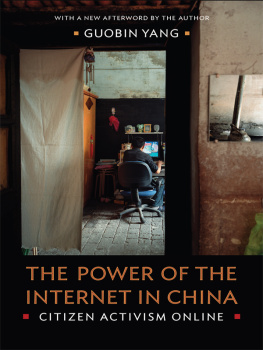Table of Contents
CONTESTING CYBERSPACE IN CHINA
CONTESTING CYBERSPACE IN CHINA
ONLINE EXPRESSION AND AUTHORITARIAN RESILIENCE
RONGBIN HAN
COLUMBIA UNIVERSITY PRESS
New York
Columbia University Press
Publishers Since 1893
New York Chichester, West Sussex
cup.columbia.edu
Copyright 2018 Columbia University Press
All rights reserved
E-ISBN 978-0-231-54565-5
Library of Congress Cataloging-in-Publication Data
Names: Han, Rongbin, 1980 author.
Title: Contesting cyberspace in China : online expression and authoritarian resilience / Rongbin Han.
Description: New York : Columbia University Press, [2018] | Includes bibliographical references and index.
Identifiers: LCCN 2017038716| ISBN 9780231184748 (cloth : alk. paper) | ISBN 9780231184755 (pbk. : alk. paper) | ISBN 9780231545655 (ebook)
Subjects: LCSH: InternetGovernment policyChina. | InternetPolitical aspectsChina. | Freedom of speechChina. | CensorshipChina. | AuthoritarianismChina.
Classification: LCC HN740.Z9 I567434 2018 | DDC 302.23/10951dc23
LC record available at https://lccn.loc.gov/2017038716
A Columbia University Press E-book.
CUP would be pleased to hear about your reading experience with this e-book at .
Cover design: Noah Arlow
To my daughter, Audrey Zhiyan Han, and my wife, Yi Fu
CONTENTS
I n 1999, as a freshman at Peking University, I lived on the Changping campus together with about eight hundred other social sciences and humanities majors. The campus, located on the outskirts of Beijing, was at least an hour away from the main campus (and from Beijing) by bus. It was rural and isolated, surrounded by wild woods, apple and peach orchards, and cornfields. The isolation was not just geographical. There were no telephones in our dorms, and Internet access in our dorms was an even more remote possibility. The entire mens dorm building shared one phone at the doorkeepers office, which only received calls from outside. To dial out, we had to use one of the three phones on the first floor of the womens dorm building. I cannot remember a single time when I waited for less than an hour to make a call. It was tough: We had high expectations for college life after entering the nations most prestigious university after succeeding on the brutal college entrance exambut virtually none of our expectations was met. In fact, many of us still call that year in Changping our fourth year of high school.
As young adults, we detested our geographical and informational isolation, taking every opportunity to visit the main campus. It was during one of those first visits that I got hooked on the Internet. I still remember that day vividly. I was visiting a high school friend. Majoring in biology, he was lucky enough to live in one of the two newest buildings, which had Internet access. I arrived after dinner, and he and his roommates were playing computer games. I watched, somewhat bored as I was not a fan. Around ten oclock in the evening, my friend took a break and asked, Anyone want a Coke? Everyone replied with a yes. He opened a new browser window, typed something, and then returned to his game. Ten minutes later, someone knocked at the door, handed us five cans of Coke, took the money my friend offered, and left. Seeing my confused face, my friend explained, Oh, I just went online and ordered the Coke. Were lucky to be within their free delivery zone. Apparently, what I had witnessed was one of the earliest business-to-consumer (B2C) e-commerce transactions in China. I was truly amazed.
I have not become another Jack Ma, though this first Internet encounter was about doing business. Rather, my experience with the Internet was soon politicized. In May 2000, a fellow Changping student named Qiu Qingfeng was murdered on her way back from an exam on the main campus. Angered by Peking Universitys slow and inappropriate reaction, students marched in protest. Our outcry was fruitless and soon died out, as we were disconnected from the outside world. Later, we learned that mobilization had also taken place on the main campus, and this action had been far more influential, longer lasting, and more effective. We also learned that the Internet, especially the campus bulletin board system (BBS), had played a significant role. Regarding this incident, Guobin Yang said, Although demonstrations and candle vigils [sic] took place on campus, it was in cyberspace that the protest first started; it then escalated into radical calls for 1989-style demonstrations, and was sustained for about 10 days amid fiery online exchanges. Apparently, had we been connected to the Internet, the protest on Changping campus could have been more successful. After all, we were the closest to Ms. Qiu. Thus, though I did not personally participate in the online mobilization, I was truly inspired by the Internets potential for civic engagement and popular protest.
After several long online conversations in late 2001, we decided to go offline, and we founded the Rural China Association at Peking University. I was so into this endeavor that I served both as an administrator of the discussion board and as an executive committee member of the association. To me, the Internet was empowering. In particular, the combination of online forum and offline civic organization gave us special strengths in connecting, mobilizing, and reaching out. We organized and participated in a number of activities on and beyond the campus.
and Bdwm, which had already been taken over by the authorities in 2003, started to restrict off-campus access. In short, the state flexed its muscle, putting online expression under much tighter constraints. This was difficult for me, as I was gradually being deprived of an important part of my life. The pain accompanied me to the University of California, Berkeley, where I finally decided to examine and reflect on my Internet experience not only from an academic perspective but also as an effort of self-redemption.
Why am I telling you, dear readers, the personal story of my online experience in such detail? Because my story explains the origin of my academic interest in the topic. Indeed, it was my deep involvement in BBS life that led me to question how online expression has, or has not, changed political life in China and its likelihood of bringing about democracy. But my primary purpose is to convey the idea that the Internet, and online expression more specifically, are living experiences to me and to many other Chinese citizens. Such experiences, though sometimes seemingly trivial, are highly complicated, interactive, nuanced, and most importantly alive, as they have undeniably transformed our lives as individuals and as a citizenry collective. I feel lucky as a researcher to be part of this great transformation. We experienced good times when relatively free expression was first made possible by the Internet, when the state still learning how to deal with it. We also experienced bad times when the state attempted to tighten its control and manipulate the Internet to its advantage. As individuals, we are both political and apolitical online. On one hand, we, at least some of us, are political in that we deliberate, debate, and mobilize online, with the hope of having an impact on political processes in China and throughout the world. We demonstrate diverse values, beliefs, and identities in our online interactions. Specifically, in terms of political orientation, some of us have constantly resisted authoritarian rule and contested state control over the Internet, whereas others support the Party-state as true believers or nationalists, or because they disagree with those criticizing the regime. Some of us are indifferent, neutral, or fluctuate among different stances at different times on different issues. On the other hand, many Chinese are online primarily for apolitical purposes. The majority of Chinese netizens surf the Internet to conduct business, search for information, communicate with friends and relatives, play games, watch videos, share life experiences, discuss lifestyle or entertainment topics, and so forth. But these activities are by no means without political implications, as they are deeply embedded in the sociopolitical context of authoritarian rule. Moreover, these apolitical citizens can quickly become politicized, even if just temporarily, when drawn into cyber-events with political significance, such as popular protests against the government, nationalist mobilization, or simply a debate with other netizens on political topics. In this sense, cyberpolitics is highly fluid in both its content and format.

